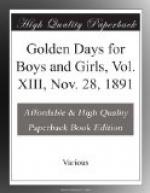The boys had already drawn their overcoat collars up to their ears. They stood, solemnly and silently, near the door, each one ready to frame the momentous question, “May I have the pleasure of seeing you home?” when the girl of his choice should pass. Some of them looked nervous; others had assumed an air of indifference, which deceived no one.
John Hampden stroked his cap, wishing that girls weren’t so slow about getting ready. But he forgot the girls in a moment, and began to repeat, under his breath, a few lines of the poem they had been reading that evening:
“Some village Hampden, that with
dauntless breast,
The little tyrant of his fields withstood.”
He wondered who Hampden was, and what he had done to make him famous enough to be mentioned in such a poem as Gray’s Elegy. Probably a great general, John decided, who had led vast armies to victory.
John smiled to himself. There surely could not have been two persons with the same name more utterly unlike, he thought, than the John Hampden of the poem and John Hampden, the druggist’s clerk—“a youth to Fortune and to Fame unknown.”
Just then two girls stopped before him, and John woke from his dreams to find that the schoolhouse was almost deserted, and that the janitor’s yawning little son had begun to put out the lights.
The girls, no doubt, thought he had smiled at them, and John had presence of mind enough left to accept the situation. He had meant to walk home with Matilda Haines, but Matilda had disappeared.
John felt that he hardly knew Margaret Shirley, she had been away in Boston so long, and he hadn’t even been introduced to the young girl beside her.
“Allow me to present Mr. Hampden, Celia—Mr. John Hampden,” said Margaret, as if in answer to his thought. “My cousin, Miss Kirke, from Boston, Mr. Hampden.”
John felt a trifle afraid of Miss Kirke, she took the introduction so smilingly and easily. John himself blushed and stammered, and felt more uncomfortable than ever, when she said, laughingly:
“How delightful to have one of Gray’s heroes escort one home, right after reading his poem! Of course, you are a direct descendant of this famous John Hampden?”
“I don’t know,” said John, awkwardly; “I’m afraid not. I don’t even know what he did. Mr. Carr didn’t explain that passage very fully.”
“Oh, nobody pretends to know all about the allusions in poetry. He lived somewhere in England, in the dark ages, didn’t he—and refused to pay taxes, or something? I forget exactly what.”
John smiled. He had recovered a little from his embarrassment.
“Why, old Mr. Hunt refuses to pay his taxes every year; but they make him do it, just the same.”
The girls laughed.
“Oh, but John Hampden protested against a great act of tyranny,” said Margaret. “He must have been very brave to do it, or Gray wouldn’t have put him in his poem.”




